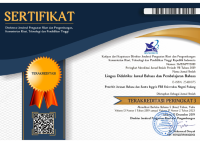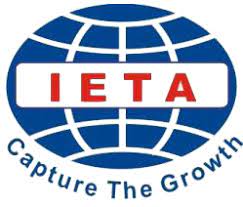The Politeness Strategies Utilized by Postgraduate Students and Lecturers in Asynchronous online-learning Discussion
 ), Ni Luh Putu Sri Adnyani(2), Ni Nyoman Padmadewi(3), Ni Komang Arie Suwastini(4),
), Ni Luh Putu Sri Adnyani(2), Ni Nyoman Padmadewi(3), Ni Komang Arie Suwastini(4), (1) Post Graduate Program, Universitas Pendidikan Ganesha Udayana Street number 11, Singaraja, Bali, 81116
(2) Post Graduate Program, Universitas Pendidikan Ganesha Udayana Street number 11, Singaraja, Bali, 81116
(3) Post Graduate Program, Universitas Pendidikan Ganesha Udayana Street number 11, Singaraja, Bali, 81116
(4) Post Graduate Program, Universitas Pendidikan Ganesha Udayana Street number 11, Singaraja, Bali, 81116
 Corresponding Author
Corresponding Author
Copyright (c) 2021 Lingua Didaktika: Jurnal Bahasa dan Pembelajaran Bahasa
DOI : https://doi.org/10.24036/ld.v15i1.112020
Full Text:
 Language : en
Language : en
Abstract
Politeness strategies are essential to communicate with others, either face-to-face or using computer-mediated communication synchronously or asynchronously. The advancement of technology also contributes to the development of the communication strategy. The study pointed at examining the politeness strategies utilized by students and teachers in an asynchronous online discussion. It used qualitative designed. The participants were 24 postgraduate students at a state university in North Bali. The data were gathered from the asynchronous online discussion on New Direction in ELT and Bilingual and Bilingual Education course. The study found that positive politeness is primarily used in the discussion. The result showed that the lecturers and students had a great awareness to apply politeness strategies in communicatio
Keywords
References
Almoaily, M. (2018). Greetings as a Politeness Strategy in EFL Distance Learning Students ’ Official Emails. November. https://doi.org/10.13189/lls.2018.060601
Brown, P., & Levinson, S. C. (1987). Politeness. Some Universals in Language Use (J. J. Gumperz (Ed.); Cambridge). Cambridge.
Correo, C. B. (2014). Politeness Strategies Deployed by Filipinos in Asynchronous Computer-Mediated Discourse. 2(August), 245–256.
Hammond, M. (2019). A review of recent papers on online discussion in teaching and learning in higher education. Online Learning, 9(3). https://doi.org/10.24059/olj.v9i3.1782
Kadar & Mills. (2011). Politeness in East Asia. Cambridge University Press.
Li, M. (2012). Politeness strategies in wiki-mediated communication of EFL collaborative writing tasks. 42, 1–26.
Mahmud, M. (2019). The use of politeness strategies in the classroom context by English university students. 8(3), 597–606. https://doi.org/10.17509/ijal.v8i3.15258
Mohammad, S., Adel, R., Davoudi, M., & Ramezanzadeh, A. (2016). A qualitative study of politeness strategies used by Iranian EFL learners in a class blog Iranian Journal of Language Teaching Research. Iranian Journal of Language Teaching Research, 4(1), 47–62. https://doi.org/10.30466/ijltr.2016.20377
Mulyono, H., Amalia, D. R., & Suryoputro, G. (2019). Politeness Strategies in Teacher-Student WhatsApp Communication. 296 | PASAA, 58.
Naoko, T., & Julie M., S. (2013). Pragmatics, Interlanguage. John Benjamins Publishing.
Peng, L., Xie, F., & Cai, L. (2014). A Case Study of College Teacher's Politeness Strategy in EFL Classroom. 4(1), 110–115. https://doi.org/10.4304/tpls.4.1.110-115
Seyyedrezaei, S. (2016). Mobile Assisted Language Learning (MALL): An Accelerator to Iranian Language Learners ` Vocabulary Learning Improvement JIEB-4-2016. 2001, 36–40.
Yuka, A. (2009). Positive Politeness Strategy in Oral Communication I Textbooks. 52(1).
 Article Metrics
Article Metrics
 Abstract Views : 671 times
Abstract Views : 671 times
 PDF Downloaded : 262 times
PDF Downloaded : 262 times
Refbacks
- There are currently no refbacks.
Copyright (c) 2021 Lingua Didaktika: Jurnal Bahasa dan Pembelajaran Bahasa

This work is licensed under a Creative Commons Attribution-NonCommercial 4.0 International License.









